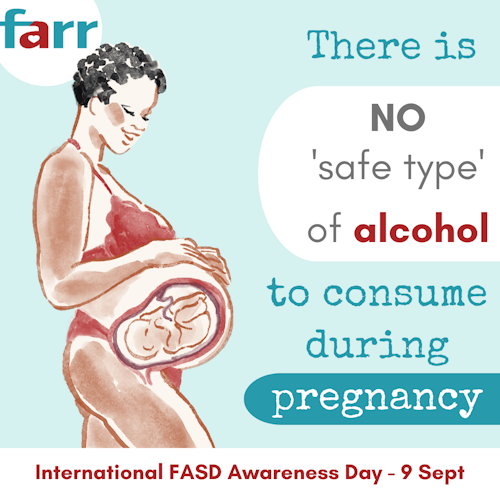Frequently Asked Questions
1. What is Fetal Alcohol Spectrum Disorder (FASD)?
FASD is the broad term used for all developmental abnormalities caused by alcohol consumption during pregnancy.
Fetal Alcohol Spectrum Disorder (FASD) is caused by alcohol exposure during pregnancy. Alcohol acts as a powerful toxin (poison) to the developing fetus and can affect the fetus within 20 minutes after the ingestion of alcohol. It affects the development of all fetal tissue and organs, although the brain and the nervous system are the most vulnerable.
After birth, the baby may present with a range of physical, neurological, behavioral and intellectual abnormalities that become more evident over time. In addition to intellectual deficits, an individual with FASD may present with the following:
- Growth retardation (small for age before and after birth)
- Organ damage, especially the brain, eyes, ears and heart
- Abnormal facial features
- Brain damage, which result in lifelong challenges such as learning disability, interpersonal relationship problems, developmental disability such as fine motor development and coordination. In addition, most of these children also present with attention and hyperactivity symptoms.
In Adolescence an individual with FASD may present with additional challenges such as:
- Poor scholastic performance
- Mental health- and substance abuse problems
Fetal Alcohol Syndrome (FAS) is the most severe form of Fetal Alcohol Spectrum Disorders. Other disorders within the FASD spectrum are:
- Partial FAS (PFAS): An individual with PFAS usually presents with some of the facial and physical signs of FASD, but do not show all features associated with FAS.
- Alcohol Related Neurodevelopmental Disorder (ARND): Any of the developing fetus’ organs can be affected by the poisonous (toxic) effect of alcohol, however the brain is especially vulnerable. Children with ARND will present with brain (neurological) damage, but few of the other obvious signs or symptoms of FASD. Diagnosing ARND demands specialized neurodevelopmental assessments (psychological testing) using scientifically developed assessment measures for FASD. This needs to be corroborated by a positive history of alcohol consumption during pregnancy, through an extensive maternal interview. Children with this condition are often wrongly labelled as naughty, hyperactive and / or with attention deficit disorder (ADHD-like behaviour).
- Alcohol Related Birth Defects (ARBD): ARBD is characterized by organ damage caused by alcohol consumption during pregnancy. These individuals do not present with any other signs of FASD, only developmental abnormalities of organ systems, i.e. heart, eye, hearing, skeletal. Diagnosing ARBD would include an extensive maternal interview confirming alcohol consumption during pregnancy as well as clinical examination by a trained medical specialist.
2. What is the difference between FASD and FAS?
FAS stands for Fetal Alcohol Syndrome, which is one form of Fetal Alcohol Spectrum Disorder. It is the most visible form of FASD and the simplest to diagnose.
3. How is someone with FASD affected?
Someone with FASD can have growth restriction, so they are shorter and weigh less than their peers. They can have birth defects, including serious organ damage, and they can have cognitive delays and intellectual difficulties.
4. Can anyone be affected with FASD?
Any developing fetus exposed to prenatal alcohol consumption is at risk of being born with FASD.
5. What is the impact of FASD on a person?
Due to the birth defects and disabilities, they may need medical help more often and may need to attend special needs schools. They can also have problems in school with paying attention and remembering information. They often have behavioural problem and struggle to form healthy relationships.
6. Can FASD be cured?
FASD CANNOT be cured. The damage caused to the developing fetus is permanent and cannot be reversed. Fortunately, FASD is 100% preventable, by not exposing the developing fetus to alcohol during pregnancy!
7. How is FASD diagnosed?
FASD cannot be diagnosed by just looking at a child, even if we know that the child was exposed to alcohol. To diagnose a child with FASD, a person needs to be evaluated by a multidisciplinary team which includes a Medical Practitioner (such as a Doctor), someone who can administer a psychological assessment (such as a Psychometrist or Psychologist) and someone who can have an interview with their mother (such as a Counsellor). Learn more about the FASD diagnostic services offered by the FARR Private Clinic.
8. Can FASD be diagnosed at birth?
It is very difficult to diagnose a newborn baby. They may be born small and underweight, they may struggle with feeding and sleeping as well. There may be other causes for this, and a diagnosis of FASD is easier to make when the child is older. One of the reasons for this is that the child has to be old enough to participate in the psychological assessment. FARR assesses children as young as 9 months of age.
9. How big is the problem of FASD in South Africa?
Learn more about the FASD Prevalence rates here
10. Can a father’s drinking cause FASD?
No. A father’s alcohol use before pregnancy can have a negative impact on the baby, but it cannot cause FASD.
It has been shown that a father’s alcohol use can have a negative impact on fertility, including abnormalities in sperm quality and sperm count. Additionally, alcohol can have an epigenetic impact on the development of a fetus as well. The impact of this can include low birthweight, impaired physical development and cognitive impairments.
While the impact may be somewhat similar to the impact of alcohol exposure in the womb, there are key differences and a father’s drinking cannot lead to FASD. The risks associated with paternal drinking, do not reduce or change the risks associated with maternal alcohol use during pregnancy. A father’s alcohol use is an additional cause for concern, and it should be included in discussions around healthy pregnancies.
11. If a woman has FASD, can she pass it on to her children?
A baby can only have FASD when it has been exposed to alcohol during pregnancy. If a woman who has FASD does not expose her unborn baby to alcohol, the baby will not have FASD.
12. What can be done to prevent FASD?
In many women, pregnancy is only confirmed at around 3 months of pregnancy. By that stage, if they have consumed alcohol, much of the harmful effects of alcohol on the developing fetus, will have already been caused. For this reason, the prevention of FASD should start with promoting awareness and education regarding the harmful effects of alcohol use during pregnancy among all sexually active women of childbearing age. Also, all pregnant women who are or have been consuming alcohol should be encouraged to stop the use of alcohol as this could prevent and minimize further risk to the developing fetus.
13. Is there a safe amount of alcohol that you can drink during pregnancy?
No. Research has not established any safe limit of alcohol use, and therefore the most prudent choice is to abstain from alcohol for the whole 9 months of pregnancy. The message is therefore very clear: No amount of alcohol is safe during any time of pregnancy.
14. Is there a time during pregnancy that it is safe to drink alcohol?
No. A fetus can be damaged by exposure to alcohol at any time during pregnancy. This is also why family planning is important as it is possible to expose your baby to alcohol before you even know you are pregnant.
15. What is government doing about FASD?
The South African government has implemented various programmes that have a positive influence on FASD. This includes the First 1000 Days programme of the Department of Health, substance abuse interventions run by the Department of Social Development, as well as the inclusive education and special needs education initiatives of the Department of Education. It is unfortunately not enough as individuals with FASD do not have access to required services and FASD is not seen as a health priority.
16. What are the consequences of FASD for an adult?
While children with FASD are sometimes able to access support through ECD centres and schools, there are no support services for adults living with FASD. As soon as they leave school, they are on their own, especially if their families are not able to support them. They may struggle to hold down jobs as they struggle to follow instructions and adhere to rules. They may also be the victims of violence and crime. Unfortunately, adults with FASD may have conflict with the law, as they are easily manipulated by other, and they do not always understand the impact of their actions.
17. Are low-alcohol drinks safe?
Low alcohol drinks may still contain some alcohol and it is unclear if this may have an impact. The safest choice is therefore to avoid even low-alcohol drinks or drinks marketed as alcohol-free if they still contain some amount of alcohol.
18. What must I do if I am pregnant and use alcohol?
If you are pregnant and you use alcohol, it is never too late to stop. While the alcohol may have affected your fetus already, stopping alcohol use will prevent further damage from happening. Speak to your healthcare provider, and ask for support from your partner, family or friends who are close to you. It is never too late to stop.

